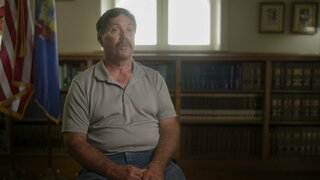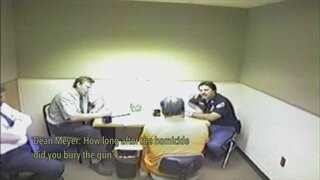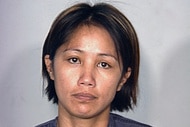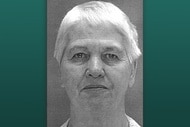Create a free profile to get unlimited access to exclusive videos, breaking news, sweepstakes, and more!
District Attorney Masterminded A Murder After Feud With Man Over Slain Dogs
A hotshot Wisconsin district attorney went to extreme lengths to protect his own reputation — and was willing to manipulate his own brothers to commit a murder.
The 1979 execution-style murder of a Wisconsin college student outside his home took state and local authorities over 25 years to resolve — and over the years the sprawling investigation exposed a drug-dealing district attorney, a simmering grudge over murdered dogs, and a deadly fraternal bond where blind loyalty landed one brother in jail for life.
The body of Rob Pfiel, a student at Mount Senario College, was discovered face down and bleeding from the back of the head outside his home in the tiny farming town of Ladysmith, Wisconsin on the night of August 14, 1979. A neighbor who Pfiel had visited to purchase milk from had reported hearing gunshots at the time — and the 27-year-old’s body was found lying on the spilled milk he’d just bought from her.
Investigators on the scene found no weapon, footprints, or other evidence — leading them to believe they were looking at a targeted attack.
“It had the appearance to everybody that was there a complete surprise shot, or an execution-like, ‘get down — boom!’” Assistant District Attorney Scott Roberts told Oxygen’s “Killer Siblings,” airing Saturdays at 6/5c on Oxygen. Roberts had been called to the scene that night because his boss — District Attorney Bob Rogers — was away.
District Attorney Rogers was something of a towering local figure in Ladysmith. Growing up in Rusk County in nearby rural Sheldon, he was raised in a farm family with eight siblings and had a tough childhood. His sharp intelligence led him to California to attend Stanford University Law. After coming back to Wisconsin in 1976 to work in Madison, he soon had a falling-out with a boss and came home to run for district attorney at the age of 32. He also began teaching criminology at nearby Mount Senario College — which was where he met Pfiel.
Pfiel had moved to the town in 1976. He was known as a gentle, low-key free spirit and an animal lover — he had three beloved dogs and was famous locally for the pet lion, named Borocon, who lived with him. His shocking murder was the first in Rusk County in decades —but for some reason, the young star district attorney didn’t want to be involved in the case.
“His response to me on that morning was, the day after, was of, like … ‘Don’t bother me with this, take care of it,’” Roberts said of Bob’s reaction. “He was terse. He wasn’t there for long. And that was pretty astonishing.”
The simmering bad blood between Rogers and Pfiel stemmed from a series of escalating events. Bob and his brothers, Mick and Dale Rogers, shared an A-frame house out in the nearby woods, which had a reputation as a party house where Bob had been dealing marijuana on the side. At one point, after meeting Pfiel at Mount Senario College, he’d asked the young student to start dealing for him — which Pfiel refused, turning the friendly relationship sour.
On June 12, 1979, Pfiel headed out of town and unfortunately while he was away his beloved dogs got loose from his home. Deputies were unable to capture the aggressive dogs, and when they contacted Bob, he said to shoot the dogs if they were unable to catch them — which they did. When Pfiel returned to find his dogs gunned down, he was devastated.
“To Rob Pfiel, the dogs were his family. He was absolutely out of his mind with rage,” Jessica McBride, a journalist with the Milwaukee Sentinel, told producers.
Pfiel then sped off to the sheriff’s office, kicked open the screen door, and punched the first deputy he saw. He then spit on Bob Rogers. Just over two months later, he was found dead. And the more investigators learned about the history between the two men, the more suspicion fell on the charismatic district attorney.
In an interview after the murder, Rusk County Deputy Vern Sanderson told investigators that he had gotten a call from Bob on Aug. 12, two days before the killing, asking him to meet outside of Ladysmith at night. When they met, Bob seemed agitated and said he’d received a phone call from someone close to Pfiel, saying that he was coming to get even for the killing of his dogs — that he would kill the two deputies and him. Bob told the deputy to tell Pfiel to stay away or else there would be trouble. Sanderson, however, refused.
That’s when Bob enlisted his brothers to protect his reputation.
When questioned, Bob told investigators that he did in fact meet with the sheriff deputy, but downplayed it and also said that the night of the murder he had been on his private plane, which records confirmed.
Meanwhile, Dale and Mick Rogers, who had now become suspects, denied any involvement, insisted that they were friendly with Pfiel, and confirmed they were each other’s alibi on the night of his death.
With that, the case soon went cold, but the mystery lingered and suspicion swirled around Bob Rogers. Pfiel’s father, Rob Pfiel, Sr., was so convinced of Bob’s guilt he soon began a crusade to hold the DA responsible for the murder. In fact, he was so dogged with the media and the courts that Bob eventually resigned from his position in July 1980 and moved back to California, where he became a lawyer and small claims judge.
Four years later, Bob turned up dead in California — after having killed a man. He had discovered that his wife was having an affair with a local gym owner, Gary Grady, and shot him in the back of the head in his house while he was sleeping. He then went to his boat at a local marina and killed himself. He was 38.
But it was his obituary in the newspaper that gave local officers a new clue: Listed in the obit was a fifth brother, Harry “John” Rogers, who had never been questioned. It turned out John had been living a quiet life off the grid with his wife, Christine Rogers. Police then began to suspect they may have found the triggerman in Pfiel’s murder.
After years of attempting to get the story out of Christine. she had a change of heart after she and John divorced. She then told investigators that the day of the murder, Bob came to visit them at her house. He went for a walk with John and when they came back, her husband looked serious. Later that night, Mick, Dale, and John piled into a van and tore off into the night.
Unfortunately for investigators, none of this information was admissible in court due to marital privilege. It wasn’t until over a decade later that a new district attorney decided to revisit the case. Kathleen Pakes, who was elected district attorney in Rusk County in 2000, said she had received a call from Pfiel Sr. and decided to look at the case.
“Even though it was 20 years ago, it was yesterday to him. His son was killed and he had never forgotten it,” Pakes told producers.
In the summer of 2004 — 25 years since the murder — a secret grand jury recommended indictments for John, Dale, and Mick Rogers. Authorities weren't quite comfortable with an arrest yet, but the brothers were aware they were indicted. Soon, all three were approached by authorities with the hope that the indictments would pressure a confession.
“The first person to corporate is going to get the best deal. That was the straw that broke the camel’s back,” Pakes said.
Harry “John” Rogers soon was arrested and agreed to a police interview. While speaking to authorities, he said that during their conversation at his house all those years ago, his brother told him that Pfiel was going to kill him.
“The conversation was, ‘John, can you do something about this guy?’ He was real nervous and jumpy and scared. I thought I was gonna rescue him,” he told police.
That night in 1979, John dropped off his two brothers in the nearby woods and approached Pfiel, who was walking up his driveway. John told investigators that he drove up alongside him and asked him his name.
“I thought, I don’t want to do nothin’ to him. But I don’t want him to kill my brothers in the woods. And I don’t want him to kill my other brother. It shouldn’t have happened. He didn’t do nothing to me,” he confessed to investigators while in tears.
In 2005, Dale Rogers, then 46, and Harry ''John" Rogers, then 52, were charged with first-degree murder in the slaying of Pfiel. Mike Rogers gave officials statements about his role and was not charged. But the brother who’d hatched the grudge murder plot would not face justice, as he was already dead.
“Bob Rogers was protecting his own reputation. And he was willing to manipulate his own brothers to commit a murder,” McBride told producers.
Dale Rogers was found guilty of soliciting second-degree murder. He served 461 days in jail and was released in May 2006. Harry “John” Rogers pleaded no contest to the murder originally but decided to withdraw the plea and go to trial. He was found guilty of first-degree murder.
When he appeared before a judge in 2009 for his second sentencing, he reportedly did not look at Pfeil's family and friends in the courtroom audience.
"A little remorse would have been nice," Pakes said after the sentencing, The Journal Times reported at the time. "I couldn't believe he didn't even have the decency to apologize to the family. That tells us all we need to know about his character."
Harry “John” Rogers was sentenced to life in prison.
To learn more about the case, watch “Killer Siblings” on Saturdays at 6/5c on Oxygen or stream the series on Oxygen.com.

































